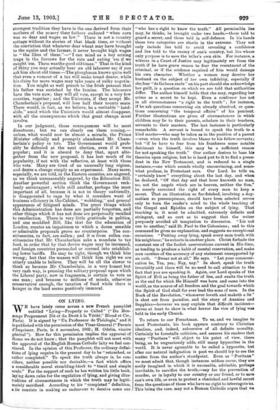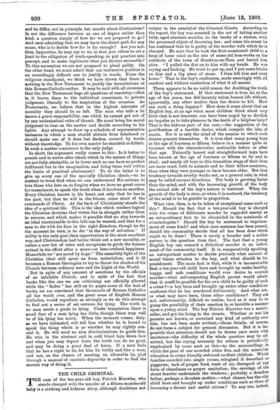ON LYING.
WE have lately come across a new French pamphlet entitled " Lying—Properly so Called " (" Du Men- songe Proprement Dit et du Droit ii In Verite," Blond et Cie., Paris). It is signed by " Un Professeur de Theologie," and it is published with the permission of the Vicar-General (" Permis d'Imprimer, Paris, le 4 novembre, 1902 ; H. Odelin, vicaire general"). How far this permission implies the approval of Rome we do not know ; that the pamphlet will not meet with the approval of the English Roman Catholic laity we feel con- vinced. In the opinion of this Professor, the ordinary defini. Edna of lying require in the present day to be "retouched, or rather completed." To Speak the truth always is, he con- siders, neither possible nor desirable,—a fact which offers a considerable moral stumbling-block to "timid and simple souls?' For the support of such he has written his little book, laying down rules for the regulation of lying, and giving illus. traiions of circumstances in which the truth may be legiti- mately sacrificed. According to his " completed" definition, a lie consists in making an endeavour to deceive some one "who has a right to know the truth." All permissible lies may, he thinks, be brought under two heads,—those told to guard a secret, and those told in self-defence. In his hands these two categories are elastic in the extreme. They not only include lies told to avoid revealing a confidence and lies told to the enemy of one's country, but lies whose only purpose is to save the teller's own skin. For instance, a witness in a Court of Justice may legitimately err from the truth if he have grave reason to fear the resentment of the criminal, or if the evidence required of him would damage his own character. Whether a woman may deceive her husband on the subject of her own infidelity, especially if she fear "de ficheux exces" on his part should she acknowledge her guilt, is a question on which we are told that authorities differ. The author himself holds that she may, regarding her crime as a secret to be kept. Even a confessor has not in all circumstances "a right to the truth" ; for instance, if he ask questions concerning sin already absolved, or ques- tions concerning "the temporal affairs" of his penitent. Further illustrations are given of circumstances in which children may lie to their parents, scholars to their teachers, servants to their masters. The last instance is particularly remarkable. A servant is bound to speak the truth to a kind master—who may be taken as in the position of a parent —even when the truth involves blame to his fellow-servants; but "if he have to fear from his frankness some notable detriment to himself, this may be a sufficient reason for not speaking the truth." Our author desires to base his theories upon religion, but he is hard put to it to find a prece- dent in the New Testament, and is reduced to a single instance,—one which sounds wholly unconvincing, and some- what profane, in Protestant ears. Our Lord, he tells us, " certainly knew " everything about the last day, and when he declared, " Of that day and that hour knoweth no man, no, not the angels which are in heaven, neither the Son," he merely exercised the right of every man to keep a secret. That an illustration so far-fetched, involving a dog- matism so presumptuous, should have been selected serves only to turn the reader's mind to the whole teaching of the Gospel and Epistles on the subject of lying. That teaching is, it must be admitted, extremely definite and stringent, and so curt as to suggest that the writer purposely avoided all temptation to discussion. " Lie not one to another," said St. Paul to the Colossians; and to this command he gives no explanation, and suggests no exceptional occasions. " Putting away lying, speak every man truth with his neighbour," he exhorts in another place. Christ forbade the constant use of the foolish asseverations current in His time, as tending to produce a habit of mental reservation, and make men careless of the accuracy of any statement unsupported by an oath. " Swear not at all," He says. " Let your communi- cation be, Yea, yea ; Nay, nay." In short, speak the truth invariably and there will be no need to call attention to the fact that you are speaking it. Again, our Lord speaks of the Spirit of Evil as being the father of lies, and exalts the truth as the end for which He Himself was born and came into the world, as the source of all freedom and the goal towards which the Spirit of God shall for ever lead the sons of men. In the Book of the Revelation, " whosoever loveth and maketh a lie" is shut out from paradise, and the story of Ananias and Sapphira—however we may explain that difficult incident— serves at least to show in what horror the vice of lying was held in the early Church.
To return to our Frenchman. To us, and we imagine to most Protestants, his book appears contrary to Christian idealism, awl, indeed, subversive of all definite morality. Certainly he forestalls criticism, and assures his readers that many " Puritans " will object to his point of view, there being, as he ungraciously adds, still many hypocrites' in the world. It is never agreeable to be called a •hypocrite, but after our natural indignation is past we should try to see the matter from the author's standpoint. Even as "Puritans" we must admit that, though instances seldom occur, they are easily imagined in which it is excusable, advisable, perhaps inevitable, to sacrifice the truth,=say for the prevention. of murder, or in loyalty to our country or our friend, or to save one's own life, or even to protect a cherished and lawful secret from the questions of those who have no right to interrogate us. This being the case, may not a Roman Catholic argue that we and he differ, not in principle, but merely about illustrations ? Is not the difference between us one of degree rather than kind, a question simply of how far• we are prepared to go ?
And once admitting that we may leave the direct path for any cause, who is to decide how far is far enough ? Are you not, then, hypocrites, he may say to us, in that you refuse to set a limit to the obligation of truth-speaking, to put practice into precept, and to make legitimate what you declare excusable ?
To this accusation we are not prepared to plead guilty. On the other band, we must admit that our instinctive position is an exceedingly difficult one to justify in words. From the religious standpoint, we think we have shown that there is nothing in the New Testament to justify the formulations of this Roman Catholic author. It may be said with all reverence that the New Testament begs all questions of casuistry,—that is, it leaves them to the individual conscience, to private judgment, literally to the inspiration of the occasion. As Protestants, we believe that in the highest interests of morality they should be so left. The man who tells a lie incurs a grave responsibility, one which he cannot get out of by any ecclesiastical rules of thumb. He must bring his moral judgment to bear on the matter and decide according to his lights. Any attempt to draw up a schedule of representative instances in which a man should abstain from falsehood or should make use of it does but darken counsel by words without knowledge. To his own master he standeth or falleth. In such a matter conscience is the only judge.
In short, the argument really comes to this : Is it better to preach and to strive after ideals which in the nature of things are not fully attainable, or to lower such as can have no perfect fulfilment but in the imagination, and bring them well within the limits of practical attainment ? To do the latter is to give up every one of the specially Christian ideals,—to be content to trust God when we can understand His actions, to love those who love us, to forgive when we have no great cause for resentment, to speak the truth when it involves no sacrifice. Every Christian knows in his heart, not only that he has in the past, but that he will in the future, come short of the commands of Christ. At the back of Christianity stands the idea of a spiritual life. This is the idea which renders logical the Christian doctrine that virtue lies in struggle rather than in success, and which makes it possible that no step towards an ideal unattainable in this liife can be wasted, and that for a man to die with his face in the right direction, though he die the moment he turn, is to die " in the way of salvation." If utility is the only goal, then opportunism is the more excellent way, and Christendom had better think out a new morality, or rather a new list of rules and exceptions to guide the human animal in his effort after a more—or less—refined happiness. Meanwhile we " are saved by hope." The unearthly light of the Christian ideal still saves us from materialism, and it ill becomes a Roman theologian to try to throw the shadow of his Church between ordinary men and the Light of the World.
But in spite of any amount of sanctions by the officials of an infallible Church, and in spite of the fact that books like the one we are criticising are officially allowed while the " Index " has still on its pages some of the best of books, we are convinced that thousands of Roman Catholics all the world over, and the great mass of English Roman Catholics, would repudiate as strongly as we do this attempt to find out a series of set excuses for lying. The truth is, no man needs a guide to lying. Under temptation there is small fear of a man lying too little, though there may well be of his lying too much. When the moment comes, duty, as we have intimated, will tell him whether he is bound to speak the thing which is or whether he may rightly con- ceal it. He will need no nice discriminations to guide him. He who in the abstract and in cold blood lays down how and when you may depart from the truth can do no good, and may be doing a great• deal of harm. If a man feels that he has a right to lie, let him lie boldly and like a man, and not, on the chance of meeting an allowable lie, plod through a manual of casuistic depravity in order to find the neatest way of doing it.











































 Previous page
Previous page